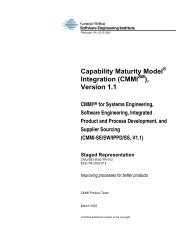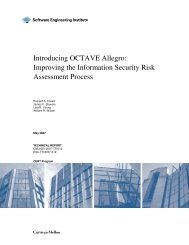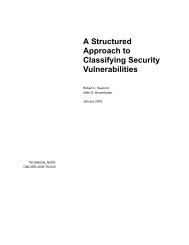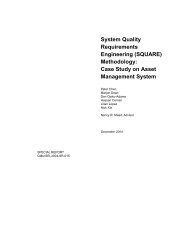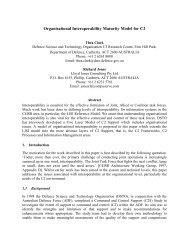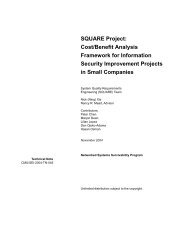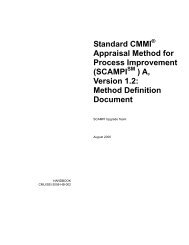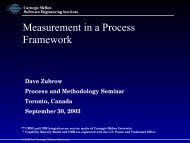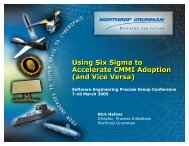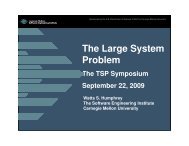State of the Practice of Computer Security Incident Response Teams ...
State of the Practice of Computer Security Incident Response Teams ...
State of the Practice of Computer Security Incident Response Teams ...
You also want an ePaper? Increase the reach of your titles
YUMPU automatically turns print PDFs into web optimized ePapers that Google loves.
<strong>the</strong> o<strong>the</strong>r teams. Again, <strong>the</strong> community <strong>of</strong> European research networks supported this idea <strong>of</strong><br />
a centralized European CSIRT and funding was established for a task force to develop a<br />
roadmap for <strong>the</strong> future <strong>of</strong> CSIRTs in Europe.<br />
2.3.3.1 Development <strong>of</strong> EuroCERT<br />
The TERENA 21 task force “CERTs in Europe” final report recognized not only <strong>the</strong> need for<br />
<strong>the</strong> establishment <strong>of</strong> more local teams situated near to <strong>the</strong> constituency experiencing <strong>the</strong> attacks<br />
and incidents, but also <strong>the</strong> need for some type <strong>of</strong> coordination to improve <strong>the</strong> overall<br />
interaction between teams [Ferriera 96]. This was seen as a way to provide a higher level <strong>of</strong><br />
support in Europe for incident handling activities than could be provided with one team acting<br />
alone. This approach led to a three-year period in which various projects were suggested,<br />
prepared, and drafted, finally culminating in a proposal for a European coordination center.<br />
This project was started later in 1997 and continued through 1999 as EuroCERT [Kossakowski<br />
96].<br />
There were various problems with this project, as some CSIRTs saw EuroCERT as competing<br />
with <strong>the</strong>ir own activities and thought that <strong>the</strong> agreements already in place between teams<br />
were efficient enough to not need facilitation or support by ano<strong>the</strong>r organization or level <strong>of</strong><br />
hierarchy. The failure <strong>of</strong> EuroCERT did not prove that coordination <strong>of</strong> CSIRTs could not be<br />
done; it showed ra<strong>the</strong>r that any coordination needed to be different from that which already<br />
existed. It needed to add value to <strong>the</strong> overall processes already in place and it needed to provide<br />
functions that were not possible under <strong>the</strong> existing individual CSIRT agreements. These<br />
problems are not inherent to European CSIRTs and organizations; similar problems have been<br />
seen in <strong>the</strong> development <strong>of</strong> CSIRT coordination efforts in various organizations, whe<strong>the</strong>r in<br />
an educational, governmental, or commercial setting. The resulting lesson learned is an important<br />
one that o<strong>the</strong>r inter-organizational CSIRT coordination efforts should keep in mind as<br />
<strong>the</strong>y work to develop collaboration and coordination mechanisms in <strong>the</strong>ir own area or region.<br />
Problems that still needed to be addressed regarding coordination between European CSIRTs<br />
included <strong>the</strong> following:<br />
• The existence <strong>of</strong> so many teams made it increasingly impractical to maintain relations <strong>of</strong><br />
<strong>the</strong> same quality with all o<strong>the</strong>r teams.<br />
• It was highly unlikely that CSIRTs from one country would understand <strong>the</strong> differences<br />
between CSIRTs in ano<strong>the</strong>r. It would be much more convenient to provide one common<br />
point <strong>of</strong> contact ra<strong>the</strong>r than, for example, having a French team need to decide which<br />
German team to notify or coordinate with.<br />
21<br />
TERENA is <strong>the</strong> Trans-European Research and Networking Association. More information can be<br />
found at .<br />
24 CMU/SEI-2003-TR-001



